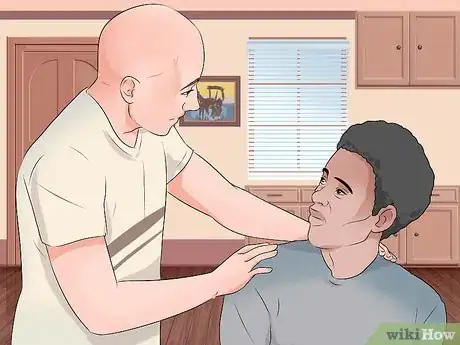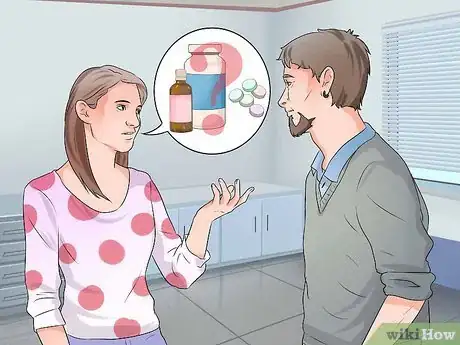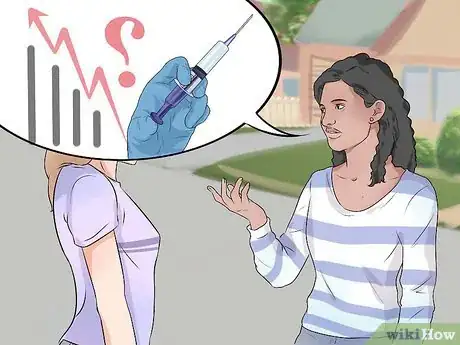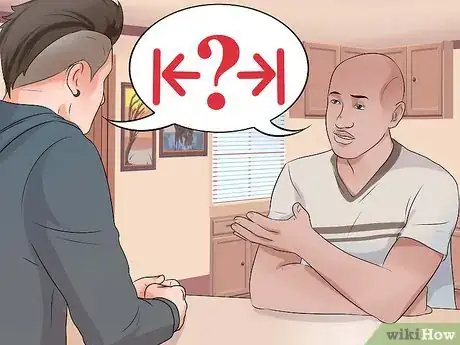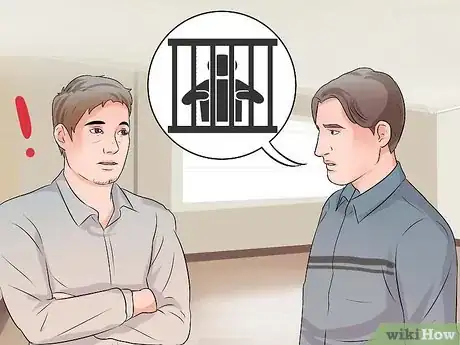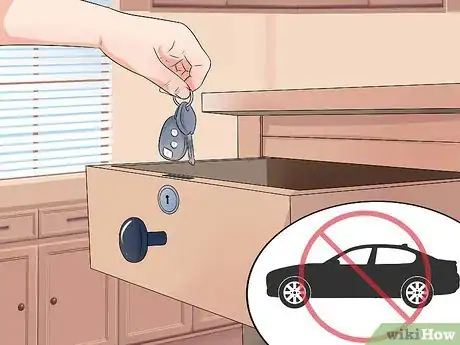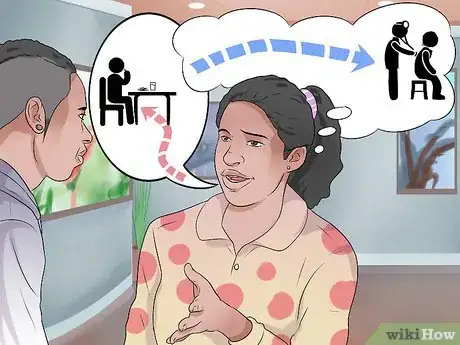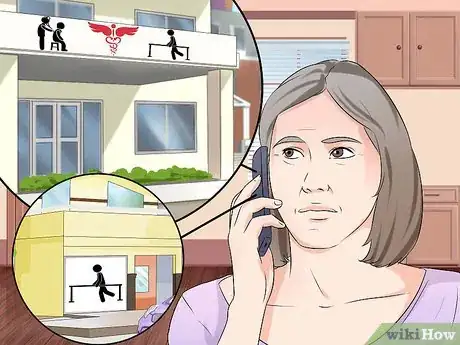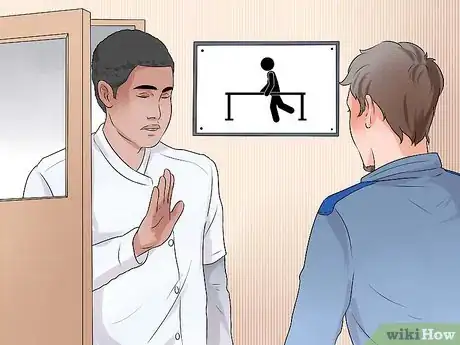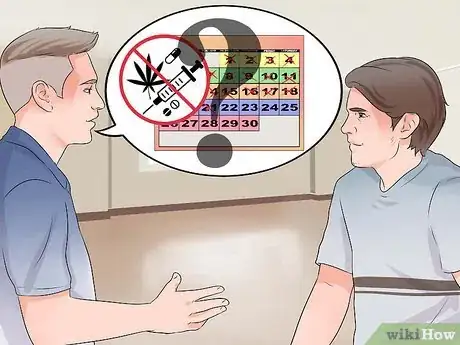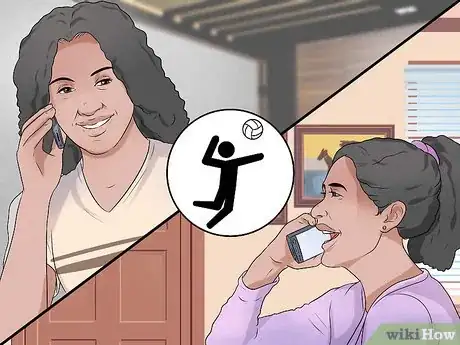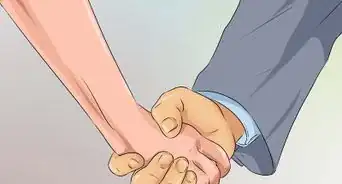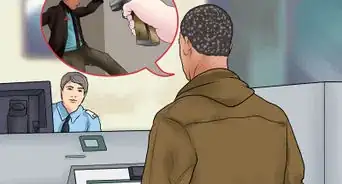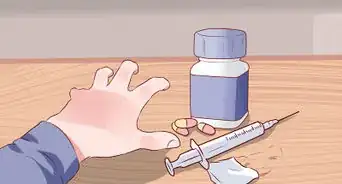This article was co-authored by Trudi Griffin, LPC, MS. Trudi Griffin is a Licensed Professional Counselor in Wisconsin specializing in Addictions and Mental Health. She provides therapy to people who struggle with addictions, mental health, and trauma in community health settings and private practice. She received her MS in Clinical Mental Health Counseling from Marquette University in 2011.
There are 13 references cited in this article, which can be found at the bottom of the page.
wikiHow marks an article as reader-approved once it receives enough positive feedback. In this case, several readers have written to tell us that this article was helpful to them, earning it our reader-approved status.
This article has been viewed 229,921 times.
What if you want to help someone who is addicted to drugs, but you don’t know how? There are many misconceptions about how to help a person who has an addiction. You cannot make a person conquer an addiction, and you can’t do the work for him. Your focus will be on offering support in various and creative ways. In order to help a person with an addiction one must understand that addiction is complex. You cannot fix the person; and above all else a person with an addiction is a person first and not just a drug addict as the title of this article indicates. The person’s battle with addiction will certainly be hard-fought, but your supportive action will positively contribute to the person’s journey.
Steps
Showing Support
-
1Be the best friend you can be. Some friendships are brief and others last a lifetime. Helping a friend through a struggle such as drug addiction is one way to make a friendship stronger. As relationships build, you tend to care more about the person. When a crisis occurs, you naturally want to help him.
- Show up when he needs you and listen to what he has to say. There are reasons this person is abusing drugs. Listening may allow him to express thoughts and feelings that will eventually help him and you to understand the root cause of the addiction.[1]
- Be respectful, loyal and reliable. Expressing one’s feelings is a brave thing to do, and it can feel risky as well. You can acknowledge this by saying, “I know this might be hard for you and I am honored you are sharing this information. I respect you for doing this. I’m here if you ever want to talk.”
- Helping a person with a drug addiction may be the most difficult, time consuming thing you will ever do, but the most rewarding.
-
2Show empathy. Being listened to and understood are key components to personal growth.[2] The emotional experience of dealing with a drug addiction will force a person to grow, which may be painful. You can help ease the person's pain by actively listening.
- Put yourself in the person’s shoes. Learn to be compassionate and accepting rather than judging the person.[3] It might be difficult to understand, but you can always try.
- Treat the person like you would like to be treated. You have probably experienced struggles in your life and know what was helpful to you, and what wasn’t.
Advertisement -
3Communicate your concern. It is hard to watch someone suffer or make poor decisions that negatively impact his life. At some point, you will have to tell the person you are concerned about his well-being. He may want to listen to what you have to say, but he may not. This is okay because you are being genuine and you are demonstrating that you care.
- Ask permission to get involved. If a person is in the throes of addiction he may not realize he needs help, but might be open to it. You can say things like, “It seems like you are struggling with this drug. I’m here for you if you want me to help. Would you be okay with that?”
- Don’t be afraid to ask the tough questions. Confronting difficult subject matter that might jeopardize a relationship is challenging. You will need to ask direct, honest questions like, “Do you think you are addicted to this drug?” and “I know it might be hard to talk about this, but I have to know if you’re willing to ruin your health, and your relationships because of it?”
Understanding Drug Dependency
-
1Observe behavior. Know the signs and symptoms of drug dependency.[4] A radical change in personality may indicate an individual is abusing drugs. Personality changes are a common sign of all types of drug addiction, including alcoholism, a dependency on prescription drugs and opiate abuse.
- Signs of opiate addiction: needle marks may be evident on the arms of someone who is abusing opiates, although many addicts become skilled at hiding evidence of intravenous drug use by injecting the drugs in unseen areas, such as between the toes. A person who is abusing opiates may also appear unusually thirsty or sweaty, and their pupils may be small pinpoints.
- Signs of alcoholism: may frequently smell of alcohol, exhibit irritable behavior, slurred speech, unusually bright or glassy eyes and difficulty expressing thoughts and ideas in a logical manner. Alcoholics often try to hide the physical evidence of the addiction, including empty bottles and cans.
- Signs of prescription drug abuse: Individuals who suffer from a dependency on prescription drugs may exhibit signs of intoxication, including clumsiness, slurred speech and may appear droopy-eyed.
-
2Keep track of dates and times of conflicts and other occasions when drugs are a problem. If an issue happens more than a couple times, then you are likely seeing a pattern developing. It is difficult to predict if the pattern will escalate and deepen the severity of the problem. You want to be prepared.
- Perhaps he or she consumes excessive amounts of a substance and continually passes out at parties. Has he or she gotten cited for a DUI or cited for substance-driven vandalism charges? Does he or she get into substance-fueled fights?
-
3Identify the person’s drug or drugs of choice. It is most common for a person with an addiction to be using multiple drugs.[5] This could be an obvious thing or a difficult thing to determine. If a person is secretly taking drugs, you may only see the signs and symptoms of abuse. When in doubt, you can always ask. Abused drugs include but are not limited to: amphetamines, anabolic steroids, club drugs, cocaine, heroin, inhalants, marijuana, and prescription drugs. [6]
- Different drugs may affect a person in different ways.
- There may be multiple drugs in a person’s system, so it will be difficult to determine.
- In the event of an overdose or medical emergency you may be the one who must tell the medical personnel what type of drug or drugs were consumed so the proper treatment can be given.[7]
-
4Determine the level of the person’s addiction. The goal would be to not wait until the person's behavior has spiraled so far out of control that relationships and situations cannot be repaired. Ideally, the person should seek help for addiction before consequences, such as job loss, abuse and neglect of loved ones and financial ruin occur.
- Ask him, "What attempts have been made by you to stop? Why do you think you weren't successful?"
- Does the person appear and sound motivated to make a change, but repeatedly struggles with sticking to his plan? Is the drug controlling the person?
- If he is your college buddy, or family friend call his family to let them know when things have gotten out of control. Don’t face the problem alone.
Taking Action
-
1Clarify if the person wants help. Basic human rights allow a person to ask for and accept help. Those same rights allow a person to reject the help he might need. This creates friction among everyone involved; and the more deteriorated the situation becomes, the more desperate you might feel.
- How involved do you want to be in the process? If you are reading this right now, you are probably invested in making a difference in a person’s life.
- Plenty of people don’t want to get involved in helping someone who is addicted to drugs, so bravo to you for wanting to get involved.
-
2Discuss and set boundaries. Healthy boundaries need to be discussed focusing on what is most helpful for the person with an addiction without being enabling. Behaviors that will enable a person with an addiction include but are not limited to: you ignore undesirable behavior; you lend the person money to buy drugs so he won't steal; you sacrifice your needs and desires to consistently help the person with an addiction; expressing your own emotions with difficulty; you lie to cover for the person with the addiction; you continue to provide help when it is unappreciated and unacknowledged.[8]
- Tell the person with an addiction that you will help him and support him and his efforts to manage his addiction, but you will not engage in anything that promotes his continued use of the addictive substance.
-
3Persuade the person to get help. All the signs are there that he needs help. Now, it's time for you to show him the realities of the situation. Sometimes you need to compassionately force a person to consider the consequences of not getting help.
- If you know he needs the help, but refuses, you can call the cops on the person to shock him into realizing he needs help. He doesn’t have to know you called the police.
- Warn the person by saying, "Jail is a horrible, dangerous, and disgusting place where no one cares about you. You don't want to go there. You will lose yourself in there and you might never recover."
- Show the person statistics and videos about drug addiction overdoses and traffic deaths caused by people who drive while intoxicated.
- Do not flush drugs down the toilet because it will pollute the water system with dangerous substances that end up in the food supply.
-
4Hide the person’s keys so he can’t drive. Driving with a person who is in possession of a controlled substance will lead to everyone in the car being cited and likely arrested. This is a perfect example of when a person's drug addiction infringes upon other people's lives.
-
5Stage an intervention. Help comes in many forms, and must be forced sometimes. It is a hard decision to make, but one that is necessary if the addiction has spiraled out of control and the person’s life is in danger.[9] While an intervention will likely be overwhelming to the person, the intent is not to put the person on the defensive. Those who will participate in the intervention should be carefully chosen. The person’s loved ones can describe how the drug abuse is affecting them.
- Prior to the intervention, develop at least one treatment plan to offer to the person. Make arrangements ahead of time if the person is going to be escorted to the drug treatment center directly from the intervention. The intervention will mean little if he does not know how to get help and does not have the support of loved ones.
- You will likely have to trick the person into coming to the location where the intervention is supposed to take place.
- Be prepared to offer specific consequences if the person rejects seeking treatment. These consequences must not be empty threats, so the person’s loved ones should consider the consequences to be imposed if he does not seek treatment, and be willing to follow through.
- An intervention may also include the person’s colleagues and religious representatives (if appropriate).
- Participants should prepare specific examples of how their loved one’s drug abuse has hurt the relationship. Often, those staging an intervention choose to write letters to the person. A person with an addiction may not care about their own self-destructive behaviors, but seeing the pain his actions inflict on others can be a powerful motivator for seeking help.
-
6Suggest a drug rehabilitation program. Contact several rehabilitation clinics and inquire about their services. Don’t be afraid to ask specific questions about their daily schedules and how the center handles relapses. If an intervention is not necessary, assist the person in researching both the addiction and recommended drug treatment plans. Be supportive and allow the person to feel in control of the impending rehabilitation.
- Tour the suggested programs and keep in mind that the more receptive the person with the addiction is of the treatment plan, the better the chances of overcoming the addiction.
-
7Visit when appropriate. If the person is admitted into an in-patient treatment program, there will be rules for visitation that will need to be clarified. Understand that you need to allow the person to participate on his own without influence from anyone on the outside. The rehab staff will inform you when to visit, and the visit will likely be deeply appreciated.
Following Up
-
1Accept the person back into your life. A person who has overcome a drug addiction will need structure in his life. You can be a big part of making that happen. A welcoming attitude might be exactly what the person needs. Every person has a need to feel a sense of belonging, and you can foster that for the person.[10]
- Encourage and suggest the potential freedoms of new, healthier lifestyles. Invite the person to go with you on new adventures. Be mindful not to pursue those things that might increase the urge to partake in drugs.
- The goal is to help the person not feel alone and to assure him that he can reach out to you and others when needed. He is going to be nervous, afraid and uncertain of his ability to stay sober.
-
2Ask the person about his progress. Make it clear that you are genuinely concerned for the person and want him to be successful. It is important that he attend therapy or support group meetings. These are likely to be a requirement of any rehabilitation program.
- Help the person be accountable to his program. Ask him if there is anything you can do to help him stay committed to attending. Don't let him slack off.
- Offer to attend meetings with him if you both are comfortable with the idea.
- Always celebrate accomplishments. If a person is sober for one day or 1000 days, each day deserves a celebration.[11]
-
3Be resourceful if the person needs your help in the future. Drug addiction is a chronic disease, therefore it can be managed, but not cured. Relapses will most likely happen, and everyone involved should not consider a relapse a failure. However, treatment will be needed following each relapse.
- Once you go through the process of helping a person with an addiction, you will have the know-how and information necessary to help. Psychologists and psychiatrists are available in your local area and can be located through the American Psychological Association and the American Psychiatric Association.[12] You can also find a substance abuse counselor using the Substance Abuse and Mental Health Services Association (SAMHSA) website.[13]
- Be there for the person (text, call, see him, do fun activities, play sports, hang out, and support the person’s hobbies and interests). Help the person conquer the temptation to use drugs if a particularly difficult situation presents itself.
-
4Be a positive influence. Remain positive in your interactions with the person; but be direct and honest and serious when necessary. He needs to know that there will be people to support him on the road to recovery, and that includes you.
Expert Q&A
-
QuestionHow can we prevent drug misuse?
 Tiffany Douglass, MATiffany Douglass is the Founder of Wellness Retreat Recovery Center, a JCAHO (Joint Commission on Accreditation of Healthcare Organizations) accredited drug and alcohol treatment program based in San Jose, California. She is also the Executive Director for Midland Tennessee at JourneyPure. She has over ten years of experience in substance abuse treatment and was appointed a Global Goodwill Ambassador in 2019 for her efforts in residential addiction treatment. Tiffany earned a BA in Psychology from Emory University in 2004 and an MA in Psychology with an emphasis on Organization Behavior and Program Evaluation from Claremont Graduate University in 2006.
Tiffany Douglass, MATiffany Douglass is the Founder of Wellness Retreat Recovery Center, a JCAHO (Joint Commission on Accreditation of Healthcare Organizations) accredited drug and alcohol treatment program based in San Jose, California. She is also the Executive Director for Midland Tennessee at JourneyPure. She has over ten years of experience in substance abuse treatment and was appointed a Global Goodwill Ambassador in 2019 for her efforts in residential addiction treatment. Tiffany earned a BA in Psychology from Emory University in 2004 and an MA in Psychology with an emphasis on Organization Behavior and Program Evaluation from Claremont Graduate University in 2006.
Founder, Wellness Retreat Recovery Center If you know that your loved one is having surgery that will require opiate pain medication, have a plan in place before that surgery happens. Talk about how long it's appropriate to use those medications, and have a plan, such as someone else monitoring the medication to make sure the person isn't taking more than they're prescribed.
If you know that your loved one is having surgery that will require opiate pain medication, have a plan in place before that surgery happens. Talk about how long it's appropriate to use those medications, and have a plan, such as someone else monitoring the medication to make sure the person isn't taking more than they're prescribed.
Warnings
- There may be times when you cannot help a person overcome his drug addiction.⧼thumbs_response⧽
- If you suspect the person has had an overdose call 911 for emergency assistance.⧼thumbs_response⧽
- A person may appear to function for years even though he has a drug addiction. It will eventually catch up to him in some way either physically, emotionally or to the detriment of his relationships.⧼thumbs_response⧽
- Severe drug addiction can result in a person committing crimes that are focused at getting money for drugs. You may be the victim.⧼thumbs_response⧽
- If violence occurs, remove yourself from the situation and call the authorities.⧼thumbs_response⧽
- In the event of an overdose, be prepared to provide information on the drugs the person has taken.⧼thumbs_response⧽
References
- ↑ http://www.wsj.com/articles/how-active-listening-makes-both-sides-of-a-conversation-feel-better-1421082684
- ↑ http://www.simplypsychology.org/carl-rogers.html
- ↑ http://jme.bmj.com/content/9/4/189.abstract
- ↑ http://easyread.drugabuse.gov/signs-drug-abuse-addiction.php
- ↑ https://onlinelibrary.wiley.com/doi/abs/10.1111/j.1360-0443.1977.tb00701.x
- ↑ http://www.nlm.nih.gov/medlineplus/drugabuse.html
- ↑ http://www.nlm.nih.gov/medlineplus/ency/article/000016.htm
- ↑ https://www.psychologytoday.com/blog/the-anatomy-addiction/201207/are-you-empowering-or-enabling
- ↑ http://www.mayoclinic.org/diseases-conditions/mental-illness/in-depth/intervention/art-20047451
About This Article
Helping a drug addict can be a challenging process, but you can help them process the root cause of their addiction by listening and encouraging them to express their thoughts and feelings. It might be hard to bring up their addiction, but at some point, try to communicate your concern so they know that other people recognize their problems. For example, say something like, “It seems to me like you’re struggling with this drug. I’m here to help you if you want me to.” Then, set boundaries with them, like not lending them money, so they understand that you’re trying to help them but not enable their addiction. Try to keep track of their conflicts and issues, so you can recognize if things are getting worse. For more tips from our Counselor co-author, including how to stage an intervention for a friend or family member with an addiction, read on!

